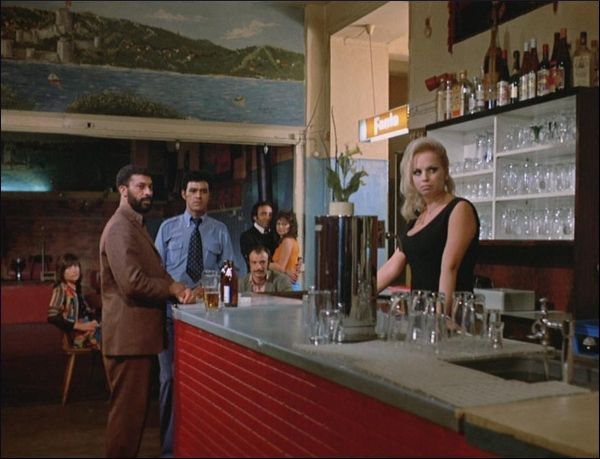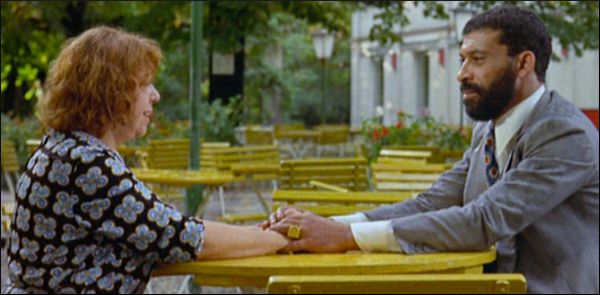Ali: Fear Eats the Soul is one of the most popular films from landmark German director Rainer Werner Fassbinder. He rose to fame during the early 70s, amid equally illustrious contemporaries like Wim Wenders and Werner Herzog. Fassbinder’s films are statements from a self-appointed chronicler of Germany, showcasing an array of intrinsically – if not exclusively – German conundrums. Through roughly 40 films in a 20-year career, Fassbinder commented on many aspects of German society: the state of the nation among the ruins of the Third Reich, the accompanying guilt following the monstrous glory of Hitler’s regime, etc. He adapted classic German novels, such as Effi Briest and Berlin Alexanderplatz, always seeking to lay bare the dominant currents of human interaction pervading the slowly recovering yet newly splintering country he lived in.
"One of the most popular films from landmark German director Rainer Werner Fassbinder."
Despite providing some of the best social criticism on various chapters of German history, Fassbinder’s movies are never didactic or dry. Rather, they tell affecting, deeply human stories that carry with them the weight of sociological problems, which add but never get in the way of the audience’s empathy for the characters. Fassbinder manages to represent a range of human relationships, setting tragic archetypes in a unique version of Germany: a country, a mindset, and a ravaged history, all portrayed through patient and methodical direction and featuring some of the best actors of their generation.

Ali: Fear Eats the Soul is perhaps Fassbinder’s most accessible work. It’s an unusually straightforward character drama, a love story with less complicated social statements than his other films. It is set in West Germany in the 1970s, a time when the country saw an influx of cheap guest workers (or “Gastarbeiter”) from Turkey, North Africa, and Eastern Europe. This led to the rapid formation of new migrant communities and neighborhoods in German cities, which awoke the latent xenophobia nestled in many local citizens. In this film, one of these guest workers, the Moroccan Ali, meets Emmi, an elderly widowed German cleaning lady. Despite being twenty years older, Emmi takes Ali home with her, and the two grow to be lovers, as they deal with feelings of loneliness and displacement. While both are able to aid each other in alleviating the burdens of an outcast existence, they face daily derision. A shop vendor refuses to serve them, Emmi’s children react with exasperation and incredulousness, her former friends become distant, and when Emmi goes so far as to marry the immigrant, both she and Ali find themselves in a cold and painful reality, a new kind of loneliness both have to struggle to deal with.
"Ali’s speech is reduced to the bare minimum, both in terms of language and of content. He suggests an air of strength and straightforwardness that is missing from Emmi’s environment."
Ali has a strong accent and the occasional grammatical mistake. The German title of the film, Angst Essen Seele auf (Fear Eats Soul), is one of Ali’s incorrectly formulated phrases, since the correct form of the sentence would be, “Angst Isst die Seele auf." The dropping of articles and the incorrect adaptation of verbs to their subjects are common struggles of immigrants with the complicated minutiae of German grammar. Ali often inverts and rearranges his sentences in order to allow for simple communication. For instance, he might express negation through a simple “nothing” or by dropping entire verbs: “Nix kaputt Freundschaft...” literally translates as “Nothing broken friendship,” though it means, in context, “No, friendships don’t break like that.” Because of his poor handling of German, Ali’s speech is reduced to the bare minimum, both in terms of language and of content. He suggests an air of strength and straightforwardness that is missing from Emmi’s environment.
At the time of the shooting, Fassbinder was in a relationship with the actor who played Ali, El Hedi ben Salem. He met him in Paris and eventually brought him to West Germany. Ben Salem’s German was even worse than that of the character he portrayed, and so he had to be dubbed over by a different actor. The couple separated shortly after the film was concluded, and Ben Salem eventually fled back to France after being involved in a knife fight in Berlin. He was convicted for the robbery of a jewelry store in Paris and succumbed to a heart attack in prison. Fassbinder continued his workaholic approach to filmmaking for another ten years. He died at the age of 37 due to a heart-attack induced by alcohol, cocaine, and sleeping pills. He was post-producing what would be his last film, Querelle.





